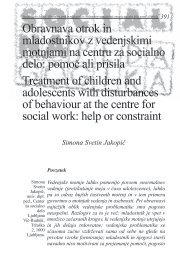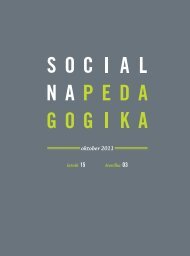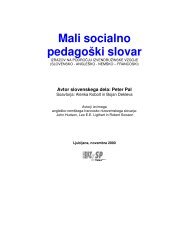št. 1 - Revija Socialna pedagogika - ZZSP
št. 1 - Revija Socialna pedagogika - ZZSP
št. 1 - Revija Socialna pedagogika - ZZSP
Create successful ePaper yourself
Turn your PDF publications into a flip-book with our unique Google optimized e-Paper software.
<strong>Socialna</strong> <strong>pedagogika</strong>: 2011 vol. 15, <strong>št</strong>evilka 1<br />
Abstract<br />
The study seeks to determine the extent to which university students’<br />
personality traits and their self-esteem can serve as the bases for predicting<br />
their grade point average (GPA). The following groups of students from the<br />
Faculty of Education in Ljubljana participated in the research: 88 students<br />
attending the first year and 80 students attending the second year of the<br />
Primary Teacher Education programme, and 41 students attending the<br />
first year of the Social Pedagogy programme. The results showed that the<br />
three groups differ in terms of the degree to which personality traits and<br />
self-esteem account for individual differences in the GPA. A low level of<br />
self-esteem (a moderate predictive power) proved to be a significant GPA<br />
predictor with second year students of the Primary Teacher Education<br />
programme, whereas the GPA of the first year students of the Social<br />
Pedagogy programme was revealed to be highly predictable on the basis<br />
of the entire set of five personality traits (a substantial predictive power),<br />
with Conscientiousness and Energy as significant single predictors. The<br />
results suggest that the predictive power of students’ personality traits<br />
and self-esteem depends on the study programme and the academic<br />
achievements included in the GPA.<br />
Key words: academic achievement, grade point average, personality, self-<br />
-esteem.<br />
Uvod<br />
2<br />
Učna uspešnost ni enovit konstrukt. Podobno kot v osnovni in srednji šoli (Kobal,<br />
2000) lahko tudi na fakulteti učno uspešnost ugotavljamo prek posameznikovega<br />
subjektivnega dojemanja uspeha, ki temelji na njegovih pričakovanjih in željah,<br />
se usmerimo na posameznikove <strong>št</strong>udijske ocene ali pa na njegove rezultate pri<br />
objektivnih preizkusih znanja. Avtorji raziskav (npr. Bratko, Chamorro-Premuzic<br />
in Saks, 2006; Duff, Boyle, Dunleavy in Ferguson, 2004; Laidra, Pullmann<br />
in Allik, 2007; O’Connor in Paunonen, 2007; Pullmann in Allik, 2008), ki se<br />
ukvarjajo s pojasnjevanjem učne uspešnosti na podlagi psiholoških značilnosti<br />
posameznikov, kot njen kazalec največkrat uporabljajo povprečno oceno pri<br />
različnih predmetih.<br />
Učna uspešnost je pogojena s <strong>št</strong>evilnimi dejavniki, ki se prepletajo in so med<br />
seboj neposredno, posredno ali interakcijsko povezani (Puklek Levpušček in












